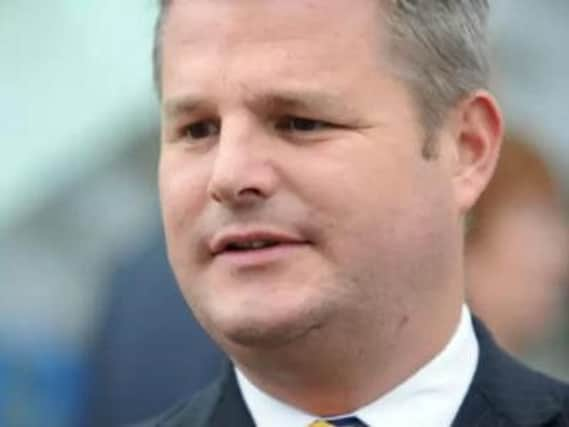Stuart Andrew interview: 'Being a Whip is a massive job... and I'm still learning'


“I’ve never wanted a boring life and I certainly haven’t got one,” jokes Stuart Andrew when pressed about his new job.
Following the election in June, the Pudsey MP was appointed as one of the new Assistant Government Whips, covering education, equality and the Cabinet Office.
Advertisement
Hide AdAdvertisement
Hide AdThe promotion marks the latest in a series of promising roles for the former charity worker, who has worked as a private secretary to party chairman Patrick Mclouglin since 2015 and was himself made a vice chairman last year.
But it also comes at a particularly challenging time for the Whips, with the recent loss of the party’s majority making every vote crucial.
“I’d be foolish if I didn’t say it would be easier if we had a majority of 50,” admits Andrew. “We have got to make sure that everybody is there.
“It’s a massive job because there is so much to learn – and I am still learning. But it is a fascinating insight into how government works.”
Advertisement
Hide AdAdvertisement
Hide AdWith TV programmes like the US reboot of House of Cards perpetuating the image of a Whip as a glorified bully boy for their party, he goes on to acknowledge there are some myths around the role in need of debunking. For a start, he argues the position is much more about listening to colleagues than scaring them into obedience.
“The image people have got is holding people up against a wall and threatening them – and its not like that at all. Anybody who knows me knows I would be completely useless at that!” he insists.
“There are various levels to it. It’s about making sure parliamentary business actually works I suppose... looking through the legislation that’s coming forward, ensuring its all ready to be presented to Parliament and making sure it steers its way through.
“And it’s also about understanding and listening to colleagues regularly, because there is a lot of value in listening to what colleagues are picking up back in their constituencies and listening to their expertise.”
Advertisement
Hide AdAdvertisement
Hide AdThe MP very nearly missed out on the new role, after Theresa May’s ill-fated decision to call a snap election almost cost him his seat. The Conservatives’ dire performance in the exit polls led to many predicting the West Yorkshire constituency would swing to Labour.
In the end, Andrew held the seat by just 331 votes. But reflecting back on a “nail-biting” night, he concedes that he had very real doubts that he would be returning to Westminster.
“I was sat back in the constituency watching the television, and I saw that exit poll and thought ‘oh my God, this puts me in a potentially difficult position’,” he says.
“When I got to the count, we [the candidates] were pulled to one side and told the result before they formally announced it. I could see on the sheet of paper that we’d both got 25,000 but I couldn’t see the hundreds, so I didn’t know if I’d just won or I’d just lost. It was a huge relief.”
Advertisement
Hide AdAdvertisement
Hide AdAndrew’s journey into professional politics has its roots in a childhood spent growing up on a council estate in North East Wales. With his father often experiencing long periods of unemployment, his family – like many others in the area – “didn’t have a lot of money”.
But what the neighbourhood lacked in wealth, it more than made up for with “bags of community spirit”. Andrew puts much of this down to the hard work of a particular local councillor. “Seeing how that councillor could empower the community to do that was something that inspired me,” he says.
He joined the Conservative party at 14 after witnessing first hand the positive impact that a number of policies enacted by the Thatcher government were having on families like his.
His father was among those to take advantage of a government business scheme that enabled him to set up a two-man roofing business. As he saw it: “The government were trying to empower people to do what they could to improve their own lives.”
Advertisement
Hide AdAdvertisement
Hide AdHis first stint in elected office came in the mid-90s when he was elected as Tory councillor in Wrexham. However, just three years later he made a drastic decision to defect to Labour after becoming dissatisfied with the direction of the party.
“At the time I felt the party was so out of touch with the public and the way society was moving... There were sometimes attacks on single mothers [and] back in those days the party was not as gay friendly as it could be,” he explains.
But he claims he soon realised his “big error”, deciding instead that if he wanted the party to change “I needed to be in it to help that”.
As one of 45 openly gay MPs in the House of Commons, Andrew has been a strong advocate of equal marriage and LGBT rights. This has often found him at loggerheads with Theresa May’s new political allies, the highly-conservative Democratic Unionist Party.
Advertisement
Hide AdAdvertisement
Hide AdAsked how he has reconciled his personal beliefs with this new partnership, he acknowledges that sometimes in politics “you have to be very pragmatic”. But he also sees it as an opportunity to influence the DUP’s views on issues like same-sex marriage.
“I hope working with us ... will encourage change and a decision to move on from those views,” he states. “My party went through it... if we can slowly through persuasion get them to alter that position that would be good.”